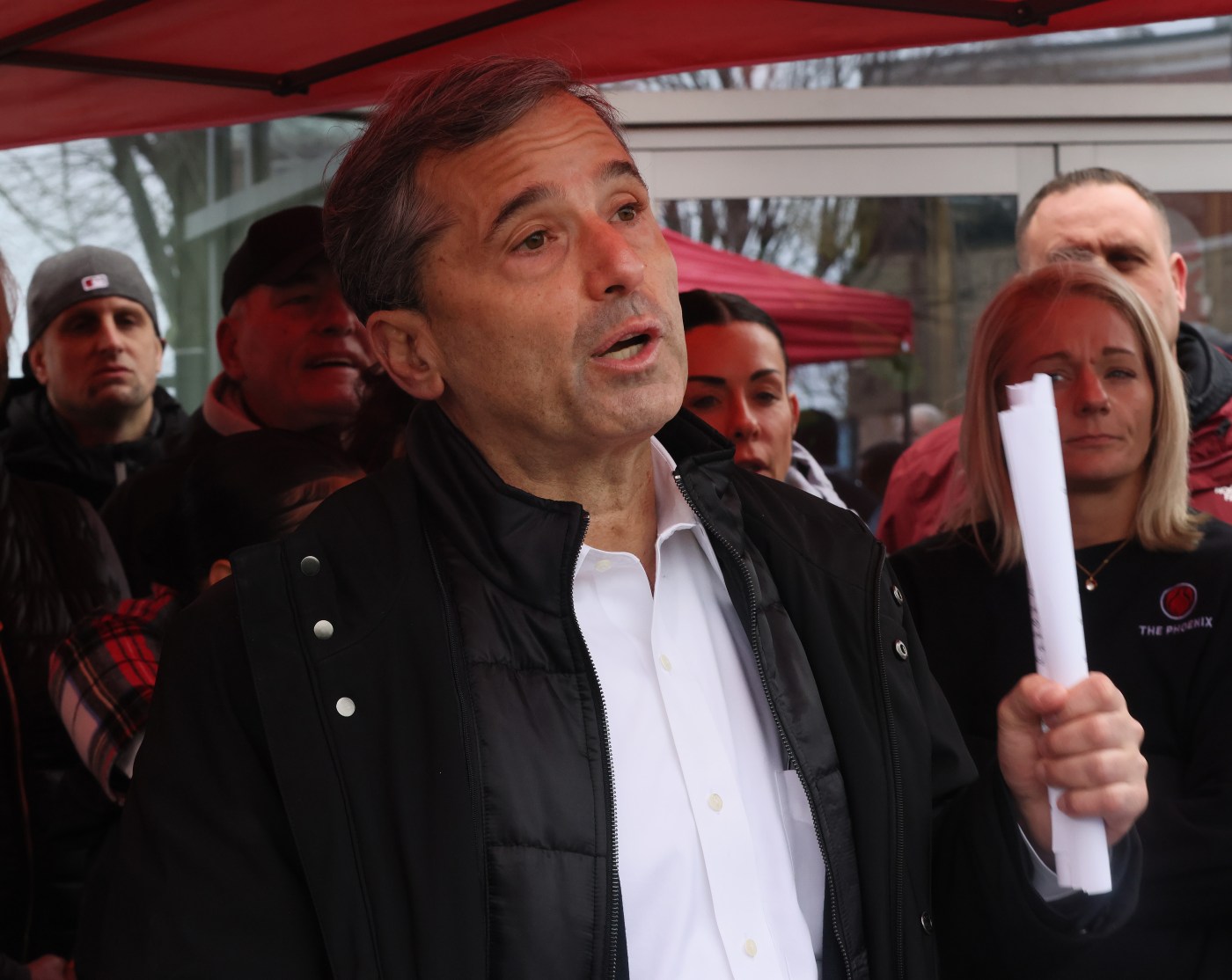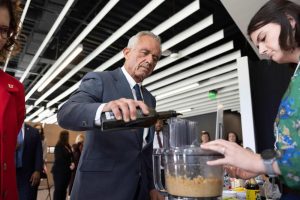
Boston mayoral candidate Josh Kraft unveils plan to tackle Mass and Cass, but won’t commit to Long Island Bridge
Boston mayoral candidate Josh Kraft would not commit to continuing the city’s plan to rebuild the Long Island Bridge out to a future recovery campus, saying that he would tackle Mass and Cass by acting on a shorter-term community-led option.
Kraft, after rolling out a three-pronged plan to tackle the violence and drug use that he says has festered at Mass and Cass under the Wu administration, raised doubts about whether he would continue the work that Mayor Michelle Wu is doing to reestablish a 35-acre addiction recovery campus on Long Island, if elected to lead the city.
“In the past, Long Island had a great track record of success with the recovery community, and we’re looking to get people into recovery as soon as possible,” Kraft said Monday at a press conference outside a Massachusetts Avenue restaurant. “It will take years to get those buildings fixed up and ready to go.
“In addition, when it comes to the bridge, I think it’s high time we turn attention to other ways to access Long Island, other methods of transportation.”
Kraft said that he would instead focus on establishing Recover Boston, a campus that he said would “provide seamless addiction recovery, mental health services and temporary housing support.”
“The Wu administration dismissed this proposal when it was made by community and business groups,” Kraft said.
The elected officials, community members and business leaders behind the Recover Boston proposal have previously described the concept as an interim campus option that would be a stop-gap until the Long Island Bridge could be rebuilt out to a permanent recovery campus.
Kraft said, however, that he sees potential for it to become a permanent solution, while raising concerns about not only the timeline, but the “hundreds and hundreds of millions of dollars” it would take to get the Long Island Bridge project completed.
“Our hope is that Recover Boston is incredibly successful, and if it’s incredibly successful, maybe there won’t be another issue,” Kraft said. “Right now, our number one concern is getting people the recovery services they so desperately need and Long Island will not be ready for that.”
Kraft said he would work with the city’s partners at the state to find the best location for Recover Boston. Proponents had homed in on Widett Circle in South Boston for such a campus before the parcel was purchased by the MBTA.
Wu’s plan to reestablish a bridge that would connect to a recovery campus on Long Island has encountered steady resistance from Quincy Mayor Thomas Koch, who has raised traffic and safety concerns.
Koch has appealed every permit issued for the project and pressed for the City of Boston to instead consider ferry transportation to the island. The city was cleared to move forward with the bridge rebuild after a key waterways permit was upheld by MassDEP, which rejected a Quincy appeal a few months ago.
Kraft’s remarks pertained to the “recovery-first model” component of his three-pronged plan to “finally solve the problems at the intersection of Melnea Cass Boulevard and Massachusetts Avenue.”
The philanthropist and son of the billionaire New England Patriots owner Robert Kraft said he would also prioritize public order and community safety, with more proactive police enforcement, and emphasize strong support for housing and other services that “help get people off the streets and back on their feet.”
Kraft vowed to deploy police with a mandate to crack down on public drug use, trespassing, and encampment, both on public and private property; rejigger enforcement with a specific Mass and Cass-focused police framework; and revive the community syringe redemption program, which was recently ended by the Wu administration.
He promised there would be sufficient shelter capacity to provide a bed for “every individual on the street,” saying he would press the state to add back the beds that were lost when it closed homeless facilities on its Shattuck Hospital campus.
Kraft said Wu’s focus on “harm reduction” has come at the expense of public safety and leaves people “perpetually stuck in the painful grip of addiction.”
“The time has come to acknowledge that Mayor Wu’s approach, replacing long-time, effective partnerships and enforcing the law with a go-it-alone strategy backed by untested, unproven theories on addiction and homelessness has exacerbated these problems across the city,” Kraft said.
“Mass and Cass is a human tragedy and it’s a public safety threat that the mayor does not want to talk about, because she does not know how to fix it,” he said. “Mayor Wu tells us over and over again how Boston is the safest city in America, but the people I’ve spoken to don’t feel safe at home.”
Kraft’s comments prompted Wu to hit back.
“This is sound bites and cheap shots at police and public health workers instead of a substantive understanding of a very complex issue that impacts so many families across our city,” Wu told the Herald. “Within my first two months in office, our administration took action to deliver more impact at Mass and Cass than in eight years before.”
Wu said her administration has ended permanent encampments in Boston, created housing and recovery beds, and directed all city departments to coordinate around ending congregate outdoor drug use.
Violent crime is down 30% and drug arrests are up 21% at Mass and Cass, year to date, according to the mayor’s office.
Related Articles
Wu says Boston is ‘not doing a hiring freeze’ or ‘mass layoffs’ in response to federal funding threats
Boston Mayor Wu takes aim at Kraft, Trump in reelection campaign launch
FBI Boston ‘deed fraud’ warning resembles Water and Sewer Commission HR director civil suit
‘We deserve this’: Boston Mayor Wu defends $100M taxpayer tab for White Stadium amid budget crunch
Battenfeld: Could White Stadium court ruling be a pyrrhic victory for Michelle Wu?
“So it’s an insult to the daily efforts of Boston police officers, public health workers and community partners to ignore their ongoing progress and take solutions that have already been implemented as ‘new ideas’ for a political platform,” Wu said. “We don’t call human beings ‘frightening’ when struggling with substance use, mental health and homelessness.
“We reach out to provide pathways out of these incredibly complex challenges because that is the only way to make a real difference for safety and quality of life across our entire community.”
Wu denied Kraft’s statement that she dismissed the Recover Boston concept, saying that she told proponents it wasn’t feasible both without funding attached and at the Widett Circle location.
She also emphasized the importance of sticking with the Long Island Bridge plan.
“This is a nationwide challenge that didn’t happen overnight and requires big-picture, long-term planning for a real fix,” Wu said. “This isn’t going to be an immediate solution, but it’s important not to give up on the regional response that is also needed in the long term.”

